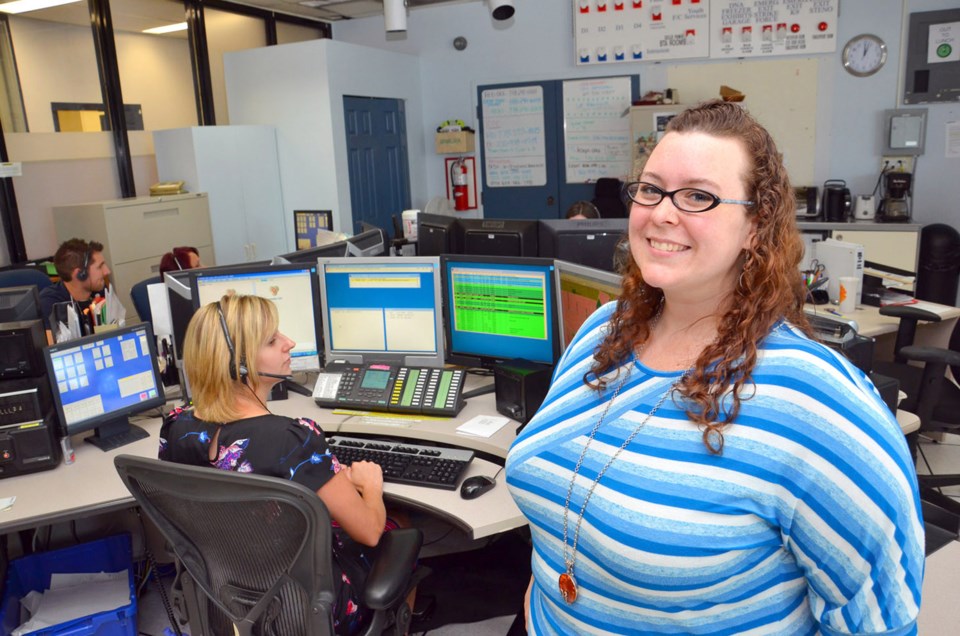Jessica Holder didn’t plan on working for the RCMP. The B.C. native worked for several law firms and companies as a secretary before falling into a job for the federal government. Through an ad in the newspaper, Holder found herself in charge of $12-million worth of inventory during the 2001 G8 Summit in Kananaskis, just outside of Calgary.
“That was my first experience with the RCMP,” she said. “And liked it so much one of the staff sergeants I worked for said ‘You should apply to our detachment, we have a position that’s coming up for a one-year temporary position.’”
And so she did.
Holder worked for the small RCMP detachment for one year before moving to Calgary where she worked for the city police department. Shortly after that, however, she applied for a position at the Burnaby RCMP detachment – with the hope of returning to B.C.
“I got hired within a month, moved out and I’ve been here ever since,” she said.
It’s been nine years since Holder moved to Burnaby, and she couldn’t be happier, she added.
“Right now I’m helping facilitate our transition to E-Comm, training staff that are going to be remaining here on some duties that we can’t take with us,” she said.
On top of her duties as training coordinator for the Operational Communications Centre – the dispatch centre at the Burnaby RCMP – she still fills in as a dispatcher when they’re short-staffed.
“I am still a OCC supervisor, and so I’ll dispatch, call take and do the information channel as required,” she explained.
Despite the near decade she’s been working in Burnaby, Holder said she can still remember some of the first calls she took as a dispatcher.
“I had a senior operator, (and) she’d plug in with me and she would answer the calls and slowly let me take over, and I remember my first suicidal person call and how scared I was taking the call, worried that I would do something wrong – and it went great,” she recalled.
Being a dispatcher takes a special kind of person, Holder added, someone who pays attention to details, is firm and organized. Most of all, though, being a dispatcher requires someone who genuinely wants to help people, she added.
“You have to really want to help someone, and for me, I never wanted to be a police officer, but I thought this could be just as good of a way to help the public.
“I remember my first child in distress call, I took a call from a young kid, and the feeling of helping them, after the call was hung up, that feeling never leaves you; the feeling that you’ve impacted someone’s life in a better way. It’s really rewarding,” she said.
Today, Holder trains new dispatchers to answer distress calls while following the proper protocol. This can include knowing how to assign calls, when to call for assistance and how to call for a translator – something dispatchers do often in Burnaby, she said.
“The first thing we want to do when (someone) calls 911 is, we want to know where they are, what’s going on and if they’re safe. So we always try and narrow down where, especially because a lot of people have trouble with street signs, English might not be their first language, and if we don’t know what’s wrong – say we need a translator – at least we can try and find them that way and get the police there to help them,” she explained.
Once an officer has been dispatched the role of the dispatcher changes. They are then required to monitor the officer’s safety and ensure he or she has everything they need to respond to the call.
While some calls can be more urgent than others, Holder said in all cases it’s important the dispatcher remains calm.
“The calmer you are, you’ll find that the caller on the other end will become calmer, as a result, depending on the situation,” she said.
This is especially good advice when dispatchers are dealing with a stressful call – even if the dispatcher is panicking on the other end of the line.
“Inside, (your) heart is pounding and your pulse is racing, but you have to keep that calm voice,” she added.
In Burnaby, the number one 911 calls received at dispatch are pocket dials. Holder said they are a problem but most dispatchers answer them like they would any other call, just in case there is someone on the other end of the line who needs help.
The second most common calls are for reports of a suspicious person, which Holder said dispatchers file as a priority call. These types of calls are priority because they could lead to crime prevention, and most callers know who belongs in their neighbourhoods, she added.
In October, the Burnaby RCMP dispatchers will be moving to E-Comm – the regional emergency dispatch service for Metro Vancouver – and Holder said she’s excited for a new challenge, which is what inspired her move to the RCMP in the first place.
“I always found myself wanting to learn something new,” she said. “When I got here I was trained as a call taker and I did non-emergency and I did 911, and it was really quite a neat experience.”



